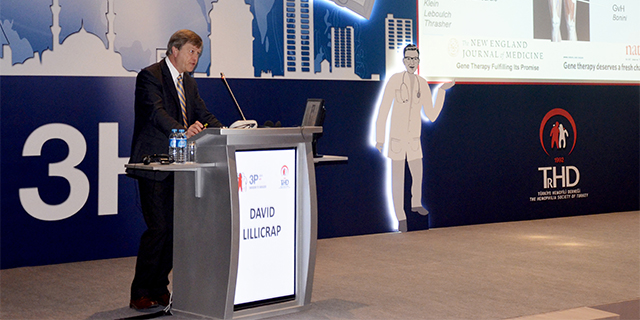Prof. Dr. David Lillicrap was in Türkiye with the Invitation Program of Scientist from Overseas
Türkiye Hemophilia Association hosted the 11th International Türkiye Hemophilia Congress, particularly hematology specialists, consisting of orthopedics, surgery, physical therapy, nuclear medicine specialists and dentists, nurses and people with hemophilia with their relatives 387 people participation was held in Istanbul on the April 17 to 20, 2014.
Congress with the call of TÜBA Principal Member and Chair of the 11th International Congress of Hemophilia Türkiye. Prof. Bülent Zülfikar, within TÜBA Scientist Invitation Program participant from Canada Queen's University professor. Dr. David Lillicrap gave called “Tomorrow in Gene Therapy' conference. Prof. session. Besides Lillicrap grown Assoc. Dr. Ergül Berber while managing Barber session, Prof. Dr. Bülent Zülfikar took place as argumentative in session.
Prof. Dr. Lillicrap summarized in the presentation; "In the 1980s, hemophilia gene since the cloning of FVIII and FIX, has been candidate diseases for somatic gene transfer (gene therapy) workings. For over the past 20 years, a small and large animal model with gene therapy has been achieved considerable success in laboratory studies. However, two years ago in human clinical practice for the treatment of hemophilia gene done, but short term expression of clotting factors can be obtained. On the other hand , in a very near future ' using adeno- associate viral ( AAV ) vector systems the factor IX molecule , long-term providing expression 2-10% levels in hemophilia B gene therapy clinical success has been achieved . After obtained this initial success, hemophilia B gene therapy trial using different AAV vector systems and different application protocols used, three different vectors study continues. Despite this success obtained by FIX gene therapy in the clinic, clinical success on FVIII gene therapy is not the case yet. The most important inhibits in front of success factor of VIII gene therapy FVIII cDNA size is large , not enough of transgene expression of FVIII and to become against FVIII inhibitor formation. Consequently, although for the repair of gene disruption by gene therapy is being studied for many years in situ, clinical applications of these works are not in the near future yet. On the other hand, recent studies have shown CRISPR - Cas9 gene editing systems can be alternative genetic methods for the treatment of hemophilia.

